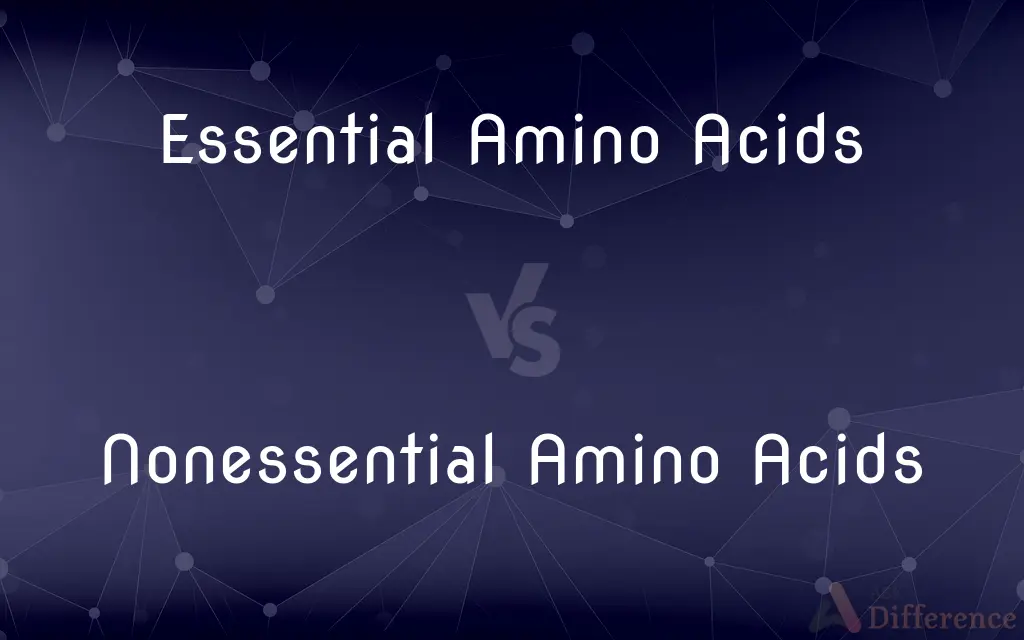Essential Amino Acids vs. Nonessential Amino Acids — What's the Difference?
By Tayyaba Rehman — Published on December 24, 2023
Essential Amino Acids cannot be produced by the body and must be obtained from the diet, while Nonessential Amino Acids are synthesized by the body and not necessarily derived from food.

Difference Between Essential Amino Acids and Nonessential Amino Acids
Table of Contents
ADVERTISEMENT
Key Differences
Essential Amino Acids are a group of amino acids that the human body cannot synthesize on its own. Their presence in our diet is crucial. Conversely, Nonessential Amino Acids are those amino acids that our body can produce, eliminating the need for dietary intake.
The significance of Essential Amino Acids in nutrition is profound, as they must be provided through our daily food consumption. Nonessential Amino Acids, though equally important for bodily functions, don't rely heavily on external sources.
There are nine Essential Amino Acids that humans must obtain from their diet. In contrast, Nonessential Amino Acids, numbering eleven, are synthesized internally by various metabolic processes.
The absence or insufficiency of Essential Amino Acids in the diet can lead to health issues, as the body can't make them. Whereas, even if Nonessential Amino Acids aren't consumed, the body can still ensure its supply.
Both Essential Amino Acids and Nonessential Amino Acids play pivotal roles in protein synthesis, enzyme function, and other cellular activities. However, the distinction lies in their source of origin.
ADVERTISEMENT
Comparison Chart
Source
Obtained from diet
Synthesized by the body
Number in humans
Nine
Eleven
Dietary reliance
Must be consumed
Not mandatory to consume
Health implications
Deficiency can cause health issues
Deficiency usually doesn't as they can be internally made
Role
Vital for protein synthesis, hormone production, etc.
Vital for various bodily functions but sourced differently
Compare with Definitions
Essential Amino Acids
Amino acids that must be sourced from diet due to the body's inability to produce them.
A lack of Essential Amino Acids in the diet can lead to health complications.
Nonessential Amino Acids
Building blocks of proteins that are sourced from internal biosynthesis.
Nonessential Amino Acids are formed from intermediates in metabolic cycles.
Essential Amino Acids
Molecules vital for hormone production, muscle development, and more.
Essential Amino Acids play a role in synthesizing certain hormones.
Nonessential Amino Acids
A set of eleven distinct amino acids produced through metabolic pathways.
Through specific pathways, the body ensures an adequate supply of Nonessential Amino Acids.
Essential Amino Acids
Compounds crucial for optimal human growth and maintenance.
Essential Amino Acids are integral for tissue repair and nutrient absorption.
Nonessential Amino Acids
Molecules that play a part in various cellular processes, including detoxification.
Nonessential Amino Acids are important for liver detoxification processes.
Essential Amino Acids
A set of nine unique amino acids imperative for various physiological processes.
Without Essential Amino Acids, certain proteins can't be synthesized.
Nonessential Amino Acids
Amino acids that the human body can manufacture without dietary intervention.
The body can produce Nonessential Amino Acids even if they aren't consumed.
Essential Amino Acids
Building blocks of proteins that aren't naturally synthesized by human metabolism.
Essential Amino Acids need to be present in food for comprehensive protein formation.
Nonessential Amino Acids
Compounds that, although synthesized internally, serve essential functions.
Nonessential Amino Acids contribute to cellular repair and energy production.
Common Curiosities
How do Nonessential Amino Acids differ?
The body can produce them, so they aren't strictly required from dietary sources.
And how many Nonessential Amino Acids exist?
There are eleven.
What are Essential Amino Acids?
They are amino acids that the body cannot produce and must be sourced from the diet.
Do Nonessential Amino Acids play a role in protein synthesis?
Yes, both essential and nonessential amino acids are vital for protein formation.
Why are Essential Amino Acids named so?
Because they are essential to obtain from food as our body can't make them.
Can the body ever produce Nonessential Amino Acids?
Yes, the body can synthesize Nonessential Amino Acids.
Can Essential Amino Acids be produced with specific reactions?
No, they cannot be synthesized by the body regardless.
Are Nonessential Amino Acids present in foods?
Yes, but their dietary intake isn't as critical since the body can produce them.
What happens if we don't consume Essential Amino Acids?
It can lead to health issues, including muscle wasting and weakened immune function.
Are Nonessential Amino Acids not important?
They are vital but can be internally produced, not relying solely on diet.
How many Essential Amino Acids are there?
There are nine.
Why is it important to know the difference between the two?
To ensure adequate dietary intake and understand bodily needs and functions.
Are supplements available for Essential Amino Acids?
Yes, there are supplements catering to those needing additional Essential Amino Acids.
Which foods are rich in Essential Amino Acids?
Foods like meat, eggs, dairy, and certain plant-based sources like quinoa and soy.
Do vegetarians get all Essential Amino Acids?
With a varied diet, vegetarians can obtain all Essential Amino Acids.
Share Your Discovery

Previous Comparison
Oberoi Hotels vs. Taj Hotels
Next Comparison
Actinides vs. LanthanidesAuthor Spotlight
Written by
Tayyaba RehmanTayyaba Rehman is a distinguished writer, currently serving as a primary contributor to askdifference.com. As a researcher in semantics and etymology, Tayyaba's passion for the complexity of languages and their distinctions has found a perfect home on the platform. Tayyaba delves into the intricacies of language, distinguishing between commonly confused words and phrases, thereby providing clarity for readers worldwide.












































